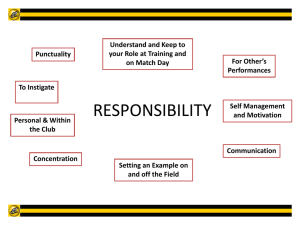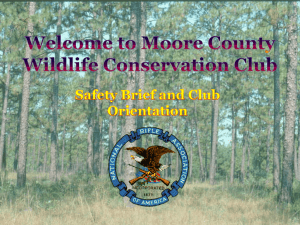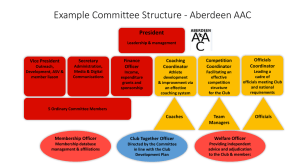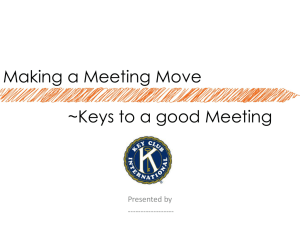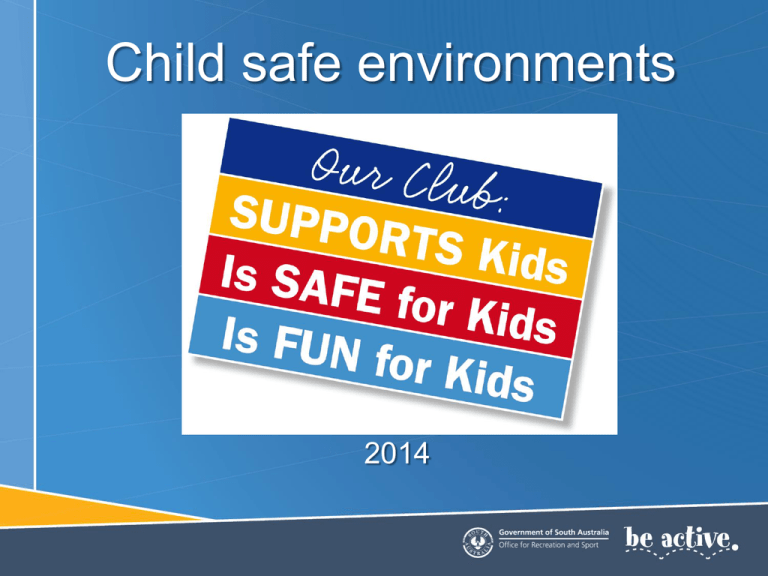
Child safe environments
2014
A child safe organisation
•
A child-safe organisation has a commitment to protect children from physical,
sexual, emotional and psychological harm and from neglect.
•
This commitment is more than simply minimising the risk or danger to children. It
is about building an environment that is both child-safe and child-friendly. An
environment in which children feel respected, valued and encouraged to reach
their full potential.
•
This commitment needs to be part of our organisation’s culture, reflected in the
policies and procedures, and is understood and embraced by all our members.
•
We have created a child-safe organisation when our club recognises its moral
and legal responsibilities to ensure that children in its care are safe and
establishes a safe and positive environment for them.
•
This approach will help our club to grow and prosper into the future
Club member’s commitment
Everyone in our club:
• is committed to promoting our kids’ wellbeing and protecting them
from harm.
• behaves according to our club’s Code of Conduct
• is always on the lookout for potential risks to the safety of our kids
• values and respect kids’ involvement and contributions to our Club
• knows how to respond to and report behaviours that are unsafe or
harmful to our kids.
Club administrator’s commitment
The people who run our club ensure:
• our club rules promote the wellbeing and safety of kids
• all reasonable steps are taken to ensure our staff, coaches,
officials and volunteers are suitable to work with our kids
• all our staff, coaches, officials and volunteers receive ongoing
training, support and development about working with kids
• our kids can get involved in helping to keep our Club Child Safe
and Child Friendly
• everyone involved in our club knows our Child Safe rules and
policies and knows where to find them.
Kid’s commitment
Our kids:
•
know it is their right to feel safe and supported in our club
•
actively participate in our club’s activities and “have a say” about
things that are important to them
•
will tell someone they trust straight away if they or their friends feel
unsafe or are being hurt in anyway
•
respect and look out for each other.
Minimum requirements of our organisation
•
•
•
•
•
•
•
•
•
Risk management plan includes risk of harm to children
Child safe policy outlines organisation commitment
Guidelines and procedures to support policy
Codes of conduct
Criminal history assessment obligations are known
Clear process for dealing with criminal history information
Procedure for recruiting suitable staff and volunteers
Staff and volunteers actively supported
Training and development provided for staff and
volunteers in child protection and child safe environments
• Encourage participation of children in organisation
• Education of staff and volunteers about role and
responsibility in reporting suspected abuse and neglect
Further information from www.families.sa.gov.au/childsafe
Recognising abuse and neglect
Understanding child abuse is important when recognising and
reporting issues
Physical
Emotional
Sexual
Neglect
-purposefully injuring or threatening to injure
-an attack on child’s self esteem (bullying, name calling,
ridiculing, threatening, intimidating or isolating)
-any sex act or sexual threat
-failure to provide the basic physical and emotional needs
Everyone in a recreation group or sporting club has a responsibility to
care for and protect all children who participate in its activities.
CHILD ABUSE REPORT LINE 13 14 78
Mandatory notification
•
Staff and volunteers of recreation and sport groups working
with children have a legal obligation to report any suspected
child abuse and /or neglect based upon reasonable grounds.
•
It is an offence to prevent a person, using threat, intimidation
or unfavourable treatment, from making a report of child
abuse.
•
Training for mandatory notification is not required however
Recreation and Sport has available free on-line training via the
Play By The Rules website www.playbytherules.net.au
(Why not require that our members - coaches, officials,
parents and participants complete this? )
•
ORS Child Safe Officer education- provided free for 1 or 2
people from a club to assist with awareness in the club
Engaging volunteers
Under the Child Protection Act 1993 all people working on a regular basis with
children require a criminal history assessment to be conducted. This is valid for 3
years.
Our club has the responsibility to identify these people and ensure they are clear
about the obligation and process. This must at least include a police check.
We should determine other strategies to screen volunteers such as referee checks,
evidence of qualifications and training,
Is there additional support or training our club can offer or recommend?
(introduction to coaching, play by the rules training (free and online), complaint
handling (free and online), child safe officer training, etc)
Volunteers should be provided with job descriptions, copy of member protection
policy, codes of conduct, procedures or other club resources to ensure they are
well informed. A well supported volunteer with clearly defined roles is more likely to
be retained!
Assessing a criminal history
•
This is best managed at an Association level- check with the State body if
you are affiliated
•
Assessment must be conducted according to the Standards set by DECD:
Families SA
•
Individuals privacy must be respected-not committee discussion
•
Individual must be given opportunity to provide contextual information
•
Keep documentation when making decision to retain employee despite
criminal history
Further information at www.families.sa.gov.au/childsafe or contact Office for Rec and
Sport on 7424 7622
Professional boundaries for coaches
• Welfare of child is a priority-Plan your activities / equipment needs (especially
safety)
• Know policies , complaint processes and codes of behaviour club has in place
• Physical contact with participants must be appropriate and seek permission before
contact
• Be careful about which part and how much of your body is in contact with child’s
body
• Avoid unaccompanied and unobserved activities with a child.
• Use positive and age appropriate language
• Knock before entering change rooms and ensure another adult is present.
• Club policy that after training or matches 2nd to last child and parents remain until
last child collected.
• Encourage all participants to be positive and respectful
Responsibility of the club
We have a responsibility to make
sure all participants can enjoy the
activity free from any form of
abuse or harassment.
We must ensure we are familiar with our Member
Protection Policy complaint handling procedures so
when issues occur so they can be dealt with quickly and
appropriately
Recommend a new free complaint handling online
course available on http://learning.ausport.gov.au
Club culture
What is it?
(consider respect, family friendly, welcoming, sideline behaviour, alcohol & drugs, fun
or win at all cost?)
How do we determine our club culture?
• Ask our members what they think-(a simple survey is great)
• Ask people outside the club how they see our club
Involve everyone in creating change
Points to consider:
–
–
–
–
Respect for all
Role of coaches (Coaches drive culture)
Community – how does our club contribute to the community
Involve all (including children and young people)
Resources for organisations
The ‘Keeping children safe in recreation and sport’
– resource booklet
Play By The Rules for online training of volunteers and participants
National and State organisations- for policies and recommended
procedures.
Web sites - Aust Sport Commission, Sport Medicine Aust, Families SA
(www.families.sa.gov.au/childsafe)
Training courses for your staff and or volunteers
(Coaching, complaint handling, Child Safe Officer– check ORS website
for future dates)
Office for Recreation and Sport www.recsport.sa.gov.au or phone (08)
7424 7622



